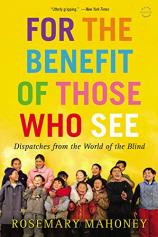For the Benefit of Those Who See: Dispatches from the World of the Blind
Review
For the Benefit of Those Who See: Dispatches from the World of the Blind
Sabriye Tenberken, director of schools for the blind in Tibet and India, tells author Rosemary Mahoney on her first visit to her institutions that “not until I accepted my blindness did I begin to live.”
Tenberken, a Norwegian afflicted with retinitis pigmentosa, lost her sight by age 12. She recounts that her teachers talked down to her and gave her special privileges, while her classmates tormented and ostracized her. Her struggles eventually led her to start, with sighted partner Paul Kronenberg, Braille Without Borders for children in Tibet, followed by an international adult school for the blind in India. Both places work with students on everything from, if necessary, basic hygiene (in cases where blind children have been neglected), to Braille, accounting, computer skills and public speaking. At the time Mahoney visited to assist with improvement of their English skills, there were students from 13 different countries, requiring a large staff and extensive funding.
Mahoney paints herself as a rather acerbic, secretly mean-spirited person who would hate being blind more than anything and doesn’t care for India at all. Yet, as her account develops, we see that she makes genuine efforts to experience blindness as much as a sighted person can, in order to identify better with the young women in her dorm. And furthermore, her patina of cynicism quickly dissipates as she listens to the real, poignant and often enraging stories the students bring to their introductory session at the international school.
"Mahoney paints herself as a rather acerbic, secretly mean-spirited person who would hate being blind more than anything and doesn’t care for India at all. Yet, as her account develops, we see that she makes genuine efforts to experience blindness as much as a sighted person can, in order to identify better with the young women in her dorm."
A German woman asserts that in her country, “they think we are retarded.” A tiny young woman from an Indian village who suffered many abuses because of her blindness says, “So there comes my mind thinking, what about the others who don’t get help?” Holi, from Madagascar, states, “We have in my country humans’ rights. But rights for disabled people has not come yet.” From Colombia, Marco, whose sister was also blind, remembered when his parents “made a Mass with the prayer that my sister and I would die.” Nearly all of the students want to return to the countries where they have been treated at times with inhuman cruelty, in order to help the blind. And, Mahoney observes, “none of them walked in a way that suggested fear.... I marveled again at the patience they exuded and the trust they placed in the physical world.”
Remarkably she conveys her students’ recollections almost word for word, even including accents and poor grammar, which of course she is there to help with. It is clear that the students will help her, too, giving her a kind of enlightenment about their darkness. One night there is a power outage, which causes her to stumble and hit her head. The next day, the students are sweet and sympathetic but remind her, gently, that they bump their heads and run into things constantly. She finds out that, far from being “anonymous” for not being seen, she is known by traits as subtle as her footfall, and the blind can sense when she is lowering her head to read or take notes, by the change in her voice.
Mahoney has used this forum to write at length about the nature of blindness, not only as she found it in Tibet and India, but also from a scholarly perspective, recounting the history and development of Braille, and offering case studies that seem to prove that blind people, if miraculously restored to sightedness, become depressed and feel disconnected from the world of acute sound and accurate touch they once experienced. They see the world as one-dimensional and distorted, rarely learn to “see” faces or read expressions, and are disappointed that people whose voices are attractive may look ugly.
To judge by her students, one could gather from this book that Mahoney thinks blind people are in some way superior to the sighted. This is a sensitivity shared with those who have worked with other kinds of disabled people. The general cheerfulness and kindness that her students exhibit seem to cut across cultures, and the compassion with which they treat one another is a lingering impression. Most of us probably assume that blindness is something we have dealt with as a society, that the work is done. FOR THE BENEFIT OF THOSE WHO SEE reminds us that, if we imagine the problems of the blind have been “solved,” we might re-examine that assumption and, if moved, take action.
Reviewed by Barbara Bamberger Scott on January 24, 2014
For the Benefit of Those Who See: Dispatches from the World of the Blind
- Publication Date: March 10, 2015
- Genres: Memoir, Nonfiction
- Paperback: 320 pages
- Publisher: Back Bay Books
- ISBN-10: 0316043435
- ISBN-13: 9780316043434





